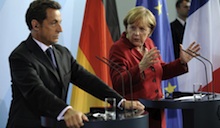
The 26-County government has been almost completely sidelined in the battle over Ireland’s economic destiny as the larger European Union governments and ‘bond vigilante’ investment funds fought over plans to deal with Dublin’s soaraway budget deficit.
EU and IMF officials are reportedly ready to release funds to the insolvent 26 County state from a financial stability fund on strict condition that new austerity measures are implemented next month.
26-County Taoiseach Brian Cowen admitted his government has no choice but to implement the draconian measures. However, he denied that comments this week by German chancellor Angela Merkel which fuelled the crisis were deliberate.
Merkel’s threat to make holders of Irish bonds pay out in the event of an EU-led bailout dramatically increased Ireland’s borrowing costs and brought a strong reaction from international investment funds, who dumped Irish bonds.
Activist bond investors known as ‘bond vigilantes’ have responded by piling pressure on the Dublin government to implement draconian budget cuts to make sure they will get their money back.
Goldman Sachs has directly called for the 26 Counties to become subject to an IMF designed programme funded through the European Stability Fund.
Ireland’s Central Bank Governor Patrick Honohan confirmed the budgetary plan to be announced next month is “very much” the sort of policy package the IMF would try to impose.
Amid reports that the IMF is already engaged in managing the state’s finances, the Taoiseach bluntly denied that he has sought emergency funds.
Mr Cowen insisted the country was fully funded until next July.
“We are part of a wider currency area and there are issues for the euro currency... we are co-operating with our colleagues on those issues,” he said.
Mr Cowen said he would work with European partners in coming weeks and months to make sure the euro remains stable.
Today [Friday] five European Union finance ministers, including Britain’s George Osborne, broke off from the G20 summit in Seoul for talks on Ireland’s economic crisis.
In an unusual move Osborne united with eurozone counterparts and put to one side the tradition of allowing them to manage issues within the single currency region.
Osborne said: “We should support the Irish Government in the steps that it is taking.”
But there are suspicions that the EU governments are happy to accelerate Ireland’s economic problems to increase their political clout.
Quoting an unnamed source, the normally reliable Reuters news agency reported that Ireland was in advanced discussions to become the second euro zone country, after Greece, to obtain an international rescue.
Sinn Féin Dáil Finance Spokesperson Arthur Morgan asked the government to say if it had been advised to call in the IMF.
He said: “Given that Goldman Sachs International Chairman Peter Sutherland was asked to advise the Government on designing an austerity programme, have they also been advised by this major Anglo Irish bondholder to call in the IMF?
“And given their obvious enthusiasm for following the bondholders’ agenda in relation to massive cutbacks will they capitulate to this demand to surrender what is left of our economic sovereignty?”
![[Irish Republican News]](https://republican-news.org/graphics/title_gifs/rn.gif)
![[Irish Republican News]](https://republican-news.org/graphics/title_gifs/harp.gif)

